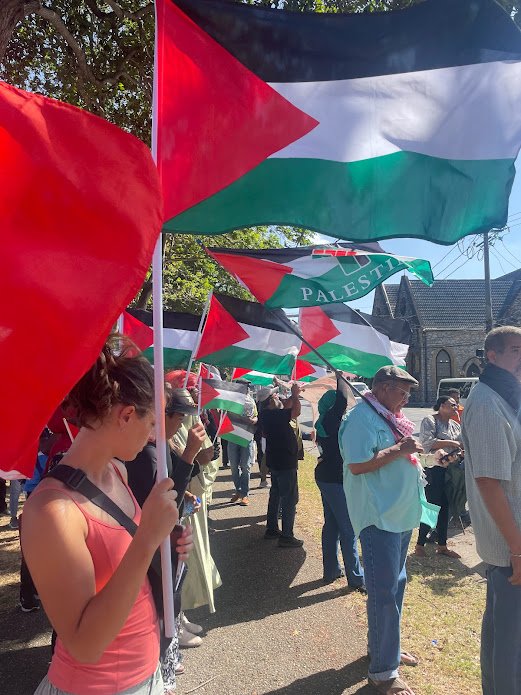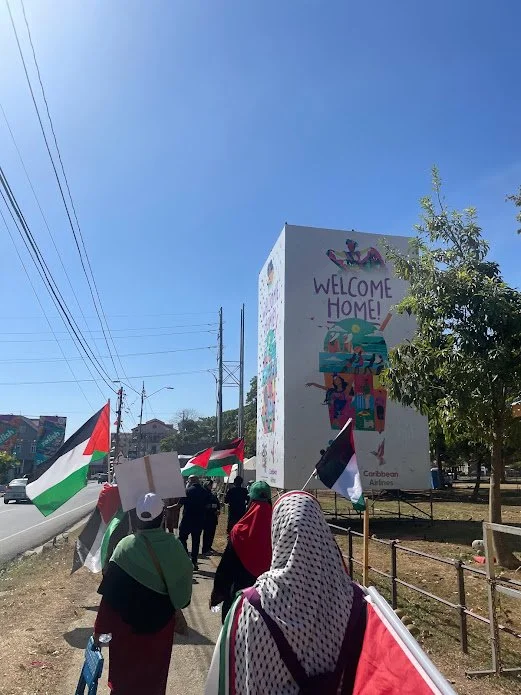Activism for Palestine in Trinidad & Tobago: A Form of Kinship in Resistance
All photos courtesy of the author.
During this year’s annual Carnival festival in Trinidad and Tobago’s capital city of Port of Spain, a Moko Jumbi – a traditional stilt walker and spirit dancer – paraded the streets representing Palestine and demanding an immediate ceasefire in Gaza.
In Trinbagonian culture, the Moko Jumbie represents a spirit walking over and protecting the souls of all those who were massacred and lost during the transatlantic slave trade. This year, its mission was extended to solidarity with the Palestinian people.
The demonstration coined “Bear With-Ness, mas’24” was organized by the band Vulgar Fraction and its founder, Robert Young, a Trinbagonian artist-activist who feels a deep connection between Caribbean and Palestinian identities.
“Understanding Haiti and understanding Trinidad...genocide happened. There was genocide to get Africans here. I have always known this, [felt] connected to this,” said Young.
Trinidad & Tobago was once shackled by the chains of enslavement in a colonial system similar to the one that has annexed Palestinian land and subjected Palestinians to settler colonial rule and genocide.
Young comes from a family of trade union members and political pioneers with his father having been involved in establishing oppositional political parties during the 1970s and 1980s.
“Understanding the world through a lens of oppression and of colonialism was always a part of my life. I always understood the importance of self-determination,” he said, alluding to Palestinians’ desire for an independent state.
Bear With-Ness, mas’24 represented just one of many pro-Palestine demonstrations on display at this year’s Carnival celebration, putting into clear view the growing support for the Palestinian cause amongst the people of Trinidad & Tobago.
While this solidarity has long existed amongst certain groups in Trinidad & Tobago, it has been put into overdrive since the Hamas attack on October 7, 2023 and the ensuing Israeli military response that has killed tens of thousands of Palestinians in Gaza, triggering protest movements across the globe.
“What’s happening in Carnival right now is reflected in what’s happening in the world,” said artist and activist Crystal Clarity, a member of Vulgar Fraction.
“There is an awakening to the most important dimensions of Carnival which are the dimensions of resistance. It is the embodiment of ‘globalize the intifada’,” she added.
Clarity explained that she had made at least a dozen stencils printed on fabric with pro-Palestinian messages and distributed them to attendees.
Palestine in Trinidad & Tobago’s 2024 Carnival
The Carnival festival is a fitting place for such forms of activism, said the members of Bear With-Ness, mas’24. Every year, through dance, art, performances, and costume design, it unites communities in remembrance and celebration of their cultural heritage and shared history.
It has also served as a setting for political expression and resistance, such as the 1881 and 1884 Canboulay uprising against colonial police and British rule more broadly – acts that are now re-enacted at the two-day event.
Canboulay, officially written as “Cannes Brulees,” meaning “burning cane,” refers to the resistance of enslaved Africans through their action of setting fire to the sugar cane during the period of enslavement in Trinidad & Tobago. This act of resistance sparked a series of riots and led to the abolition of slavery.
This year, the political climate at Carnival was different in some respects, with remembrance and the Carnival celebration expanding its boundaries to provide space for advocacy for Palestine.
Trinidad & Tobago, a country scarred by the memories of forced displacement, inhumane working conditions, disfigured relationships with agriculture, and dehumanization in the name of rebirthing a “British Trinidad & Tobago,” feels for Palestine.
This solidarity, however, has been harbored for years. Even before October 7, across the twin islands, it was common to find “free Gaza” signs drawn and written on the streets of the islands.
For these communities, “Gaza” has become a word of solidarity wherein they call themselves “Gazans” as a form of relating to Palestinians.
Resistance and Advocacy Through Protest
The Islamic Missionaries Guild, a community-based group that organizes events for the Muslim community in the region, has been consistently organizing protests in support of Palestine in front of the US embassy in Port of Spain.
“We live so far away, but we have an impact,” said Imtiaz Muhammad, an active member and leader of the community who has been organizing and putting together these protests since October 7. “The US embassy sends reports to their country very frequently, and our protests are always included in those reports. We must keep our collective consciousness alive.”
Muhammad also emphasized the need for moral clarity and consistency. “We don’t just sympathize because of Islam. We are a nation capable of feeling and understanding,” she emphasized. “With Ukraine, everyone was in support. Why not Palestine? This has been happening for 75 years.”
Another activist, David Abdullah, outlined the relationship between Trinidad & Tobago and Palestine by drawing connections between lived experiences of colonialism and imperialism:
“We must never get tired of standing up for what is right and just. Solidarity is what the people of Palestine and Gaza need. This is a struggle against colonialism and imperialism not only experienced globally, not only in South Africa, but also here in Trinidad & Tobago. Stop the colonial occupation.”
The role of IGDS Ignite
Nevertheless, the activism that was extended by the community was, in many ways, exclusionary of the public that did not traditionally identify with Islam. This reality heavily includes the LGBTQ+ community who were repeatedly turned away from participating in protests.
IGDS Ignite was founded by Dr. Gabrielle Hosein in 2016 to reignite the spark of activism in students who get lost over the years of moving across the education system. It is a space for resistance within the Institute of Gender and Development Studies (IGDS) Department at the University of the West Indies in Trinidad & Tobago.
“Chalk for Palestine” and “Queers Fuh Palestine” were two events organized by the group in support of Palestine throughout the initial months following October 7. To this day, the group is the biggest student-led activist group across the twin islands focusing on intersection and transnational feminism as one of its key frameworks.
The power of local-global solidarity
On May 2, 2024, the Ministry of Foreign and CARICOM (The Caribbean Community and Common Market) Affairs released a public statement stating their formal recognition of the Palestinian state.
According to the ministry, “[The] Cabinet has determined that the formal recognition of Palestine by the Republic of Trinidad and Tobago will assist in the achievement of a lasting peace by strengthening the growing international consensus on the issue of Palestinian statehood.”
Coupled with this statement, the ministry has made it clear that their support for Palestinian statehood is based on their position within their foreign policy that highlights a two-state solution.
The genocide in Palestine and the attacks on Gaza continue to this day, and as Palestinian issues become more and more global, the need for global action could not be any more necessary than it is now. This includes everything from businesses boycotting products that support the genocide to students centering their research on the topic.
In this light, it is clear that the actions taken by groups of students, activists, performers, artists, and practicing religious individuals across the twin islands have left an undeniable mark.











